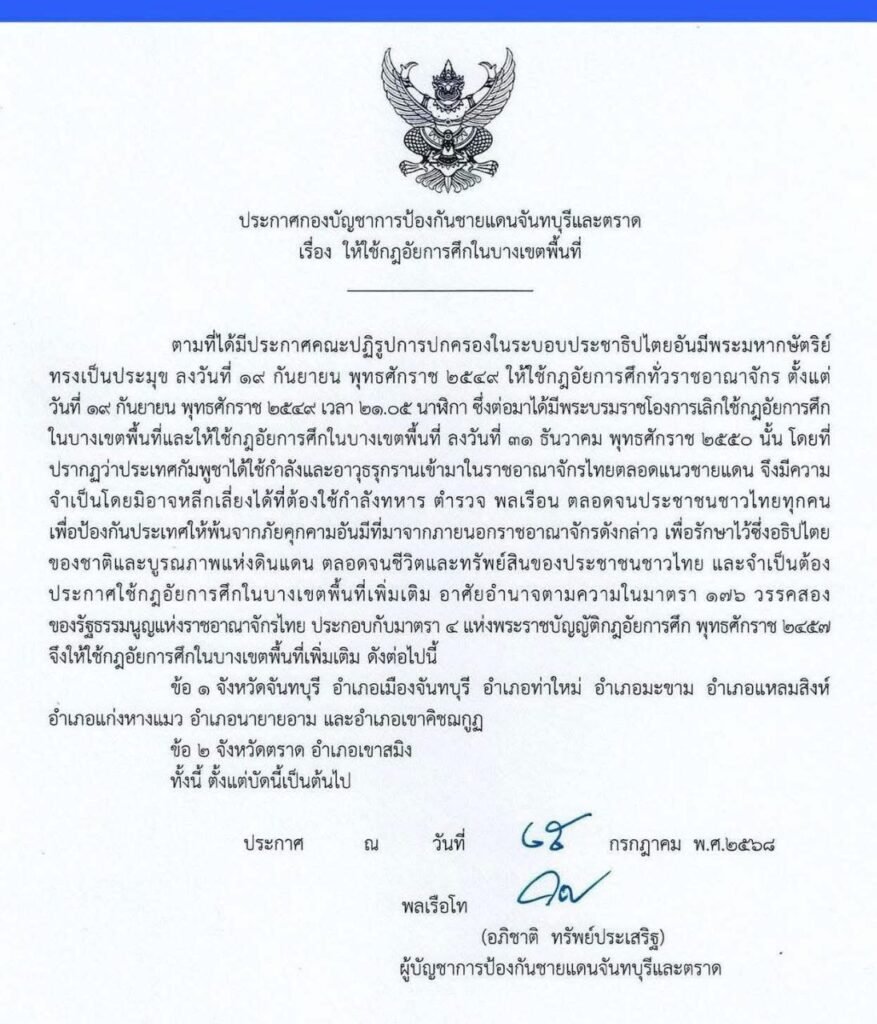
Understanding the Current Situation
Thailand’s southern border provinces are currently experiencing a troubling climate of unrest and violence, which poses significant challenges to the region’s stability. The persistent conflicts are primarily attributed to a complex mix of historical grievances, social dynamics, and regional aspirations for greater autonomy. The areas affected include Pattani, Yala, and Narathiwat, which have long been subjected to sporadic acts of violence and a fragmented social fabric, often fueled by ethnic and religious differences.
In recent years, the frequency and severity of incidents have escalated, with various forms of violence including armed attacks, bombings, and targeted assassinations becoming commonplace. These attacks are often carried out by insurgent groups seeking to assert their presence, strike terror, and demonstrate their opposition to the central government. Such terrorism not only results in tragic loss of life but also exacerbates tensions within communities, contributing to an atmosphere of fear and instability.
Moreover, sabotage operations aimed at disrupting public infrastructure and economic activities are prevalent in the region. Recent incidents have highlighted the vulnerability of critical facilities, including transportation networks and local businesses, which have suffered considerable property damage. These actions not only impair everyday life for residents but also hinder economic development and recovery efforts, rendering the situation even more dire.
The ongoing violence has inflicted considerable psychological trauma on the populace, contributing to a pervasive sense of insecurity. With local security forces often outnumbered and overwhelmed, the need for an effective, coordinated response from the Thai authorities has become increasingly urgent. A comprehensive approach is essential to address these underlying issues, facilitate peace-building initiatives, and restore a sense of normalcy across these troubled southern provinces.
The Role of the Internal Security Operations Command (ISOC)
The Internal Security Operations Command (ISOC) plays a crucial role in managing security threats in Thailand, particularly in the southern border provinces where socio-political unrest has been prevalent. Established to enhance national security, ISOC is tasked with coordinating various security agencies to uphold public safety and ensure law and order amidst a backdrop of historical conflict and terrorism. This coordination is particularly vital given the complexities surrounding the insurgency that has engendered violence and disrupted daily life for the local population.
One of ISOC’s primary responsibilities is to develop and implement strategies aimed at countering insurgent activity and mitigating the risks associated with terrorism. The agency employs a multi-faceted approach, which includes intelligence gathering, community outreach, and rehabilitation programs for affected individuals. By fostering collaboration between local communities and security forces, ISOC aims to build trust and promote peace, which is essential for long-term stability in these regions. Furthermore, the command focuses on establishing communication channels that allow local residents to report suspicious activities, thereby enhancing community participation in security efforts.
ISOC’s established protocols are designed to address any instances of violence swiftly and effectively, employing measures that range from immediate response units to strategic operations that neutralize threats before they escalate. The agency also plays a pivotal role in crisis management, ensuring that adequate resources are allocated during emergencies to protect civilians. Through regular training and drills, ISOC aims to prepare its personnel to respond efficiently to any security challenges that may arise.
Overall, ISOC’s intervention is significant in maintaining public safety in the southern border provinces of Thailand. Its ongoing efforts to coordinate security tactics, promote community engagement, and implement proactive measures are vital in addressing the persistent threats posed by terrorism and violence.
The Internal Security Act: Special Authorities and Measures
The Internal Security Act (ISA) of Thailand is a vital legal framework that empowers the Internal Security Operations Command (ISOC) to address security challenges effectively, particularly in the country’s southern border provinces. Enacted to maintain national security, the ISA grants extraordinary powers to the ISOC, enabling it to coordinate responses to various threats, including insurgency and civil unrest. This legislative framework is critical for establishing a commanding approach toward managing internal security while balancing civil liberties.
Under the provisions of the ISA, there are specific scenarios under which these special authorities can be activated. For instance, when deemed necessary to preserve public order or ensure the safety of citizens, the ISOC may impose emergency measures such as curfews, restrictions on movement, or the prohibition of public gatherings. In instances involving heightened tensions or imminent threats, the act allows for increased surveillance and the deployment of military forces alongside law enforcement agencies. These exceptional powers are designed to facilitate a swift, coordinated response to potential crises that might threaten stability in the region.
The implications of implementing such special measures can be profound. While the ISA aims to restore order and address security threats effectively, there is an inherent risk of overreach, where civil rights may be compromised. Concerns surrounding the potential for abuse of power have often been raised by human rights advocates, highlighting the need for oversight and accountability in the execution of ISA provisions. The balance between ensuring security and protecting individual freedoms remains a contentious issue. Therefore, while the ISA serves to enhance security frameworks in Thailand’s southern border provinces, careful consideration and restraint in the application of its powers are necessary to uphold the rule of law.
Potential Outcomes and the Path Forward
The implementation of strong security measures under the Internal Security Act (ISA) in Thailand’s southern border provinces presents a complex landscape of potential outcomes that warrant careful consideration. This initiative not only impacts public safety but also has broader implications for community relations and regional stability. A comprehensive strategy must address these facets to ensure a balanced approach that respects civil liberties while enhancing security.
To begin, reinforcing security through the ISA is anticipated to lead to a reduction in violence and crime rates in the affected areas. Improved law enforcement capabilities are crucial in deterring insurgency and criminal activities that have plagued these provinces. As security personnel adopt a proactive stance, they can foster a safer environment for communities, thereby instilling confidence among residents and stakeholders alike. This heightened sense of safety is vital for the socio-economic revitalization of the region.
However, the implementation of such measures may also pose challenges regarding community relations. Trust erosion between local populations and the authorities remains a significant concern, particularly in regions historically marked by conflict. To mitigate these risks, stakeholders must prioritize community engagement and transparent communication. Establishing dialogue with local leaders and citizens will aid in fostering understanding and cooperation, which is essential for the long-term success of security operations.
Looking ahead, a balanced approach that reconciles security measures with civil liberties is paramount. The Internal Security Operations Command (ISOC) is encouraged to adopt strategies that integrate community-based initiatives with security frameworks. This may include community policing, conflict resolution training, and investment in social programs that address the root causes of unrest. By adopting a holistic strategy, ISOC can facilitate sustainable peace and stability, ensuring that the rights and dignity of the affected populations are upheld alongside enhanced security. It is through such comprehensive planning that a brighter future may be envisioned for Thailand’s southern border provinces.

